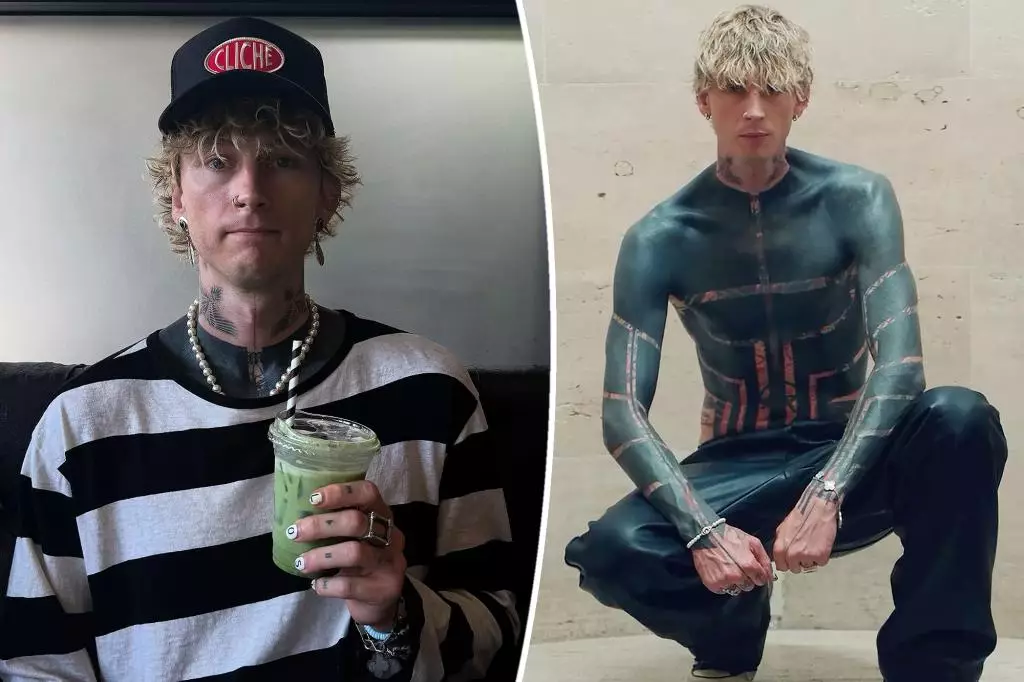In recent discussions, fans have found themselves increasingly concerned about the health of celebrities who openly endorse extreme dieting practices. The case of Machine Gun Kelly (MGK) highlights a troubling trend—celebrity behavior that glorifies fasting to an unhealthy degree. MGK’s candid admission of consuming minimal food, primarily water and occasional probiotic-rich meals, paints a picture of someone pushing their body well beyond its natural limits. While fasting has gained popularity for its purported health benefits, the reality is often far more complicated and potentially dangerous when taken to extremes.
Many individuals idolize these public figures without understanding the inherent risks of such diets. MGK’s claim that he sometimes sustains himself on just water and probiotic-rich broths might seem harmless or even admirable to some, but it is a slippery slope toward nutritional deficiency, muscle loss, and mental fatigue. The myth that one can survive healthily on minimal intake ignores the complex needs of the human body, which relies on a balanced intake of proteins, fats, vitamins, and minerals. Celebrities endorsing such lifestyles risk normalizing disordered eating behaviors, especially among impressionable fans.
The Myth of ‘Healthy Fasting’ and Its Assertions
MGK’s explanation that he sometimes eats bone broth, kimchi, and sauerkraut—primarily for their probiotic content—raises questions about understanding nutrition. While these fermented foods support gut health, they are not substitutes for complete meals. Fermented foods are beneficial but are low in calories and macronutrients necessary for maintaining energy, muscle mass, and organ function. The claim that these foods alone suffice for sustenance demonstrates a fundamental misunderstanding of what integral nutrition entails.
Furthermore, MGK’s acknowledgment of occasionally drinking celery juice, coconut water, coffee, and smoking cigarettes paints an incomplete and somewhat unhealthy picture of his overall wellness. The combination of stimulants like caffeine and harmful habits like smoking, compounded with an almost obsessive fasting routine, suggests a potential neglect of foundational health principles. Relying on such a diet could lead to immune suppression, hormonal imbalances, and long-term deterioration of physiological resilience.
The Psychological and Physical Toll of Fasting Extremes
The glamorization of extreme fasting also risks overshadowing its mental health implications. Enduring prolonged periods without proper nourishment can induce mood swings, anxiety, and impaired cognitive function. For someone with a high-pressure career, like MGK, these effects could significantly impair performance and overall well-being. The allure of rapid weight loss or perceived purity through such lifestyles often masks the toll it takes on mental stamina, emotional stability, and physical health.
Moreover, the casual tone MGK uses to describe such practices could misleadingly imply that they are sustainable or even advisable. No matter how popular or trending, extreme fasting is not a sustainable health strategy but a potential pathway toward serious medical issues if practiced without proper supervision. While it’s tempting to romanticize the “poverty diet” of fasting, in reality, it often leads to nutritional deficits that compromise organ health, immune response, and metabolic processes.
The celebrity narrative surrounding fasting should serve as a cautionary tale rather than a blueprint for health. Instead of glorifying extreme deprivation, there needs to be a balanced approach emphasizing nourishment, medical guidance, and sustainable habits. The fascination with pushing physical limits is tempting but inherently dangerous without a full understanding of the body’s complex nutritional needs.

